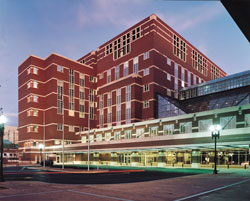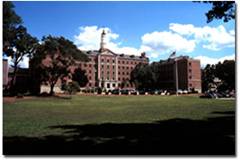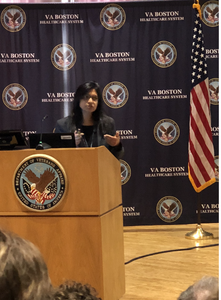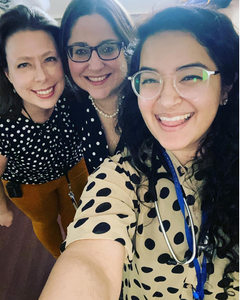Clinical Rotations and Facilities
The Facilities The Consultation Service Inpatient Clinical Electives
The first year of fellowship training is primarily focused on providing consultations for the inpatient services at the Boston Medical Center (BMC) and the Veterans Administration Boston Healthcare System (VABHS).
The Facilities

Boston Medical Center (BMC) was formed in 1996 when Boston City Hospital and Boston University Medical Center Hospital merged. Boston Medical Center is a private, not-for-profit, 514-licensed bed, academic medical center located in Boston’s historic South End. As the principal teaching affiliate of Boston University School of Medicine, BMC is devoted to training future generations of health care professionals. Every member of the hospital’s medical and dental staff holds an academic appointment at the Boston University School of Medicine or at the Boston University Goldman School of Dental Medicine. Boston Medical Center operates 66 residency training programs with 817 resident and fellowship positions.
BMC has one of the busiest Emergency Departments and the largest 24-hour Level I trauma center in New England. With 26, 339 admissions and 1,001,304 patient visits last year, BMC provides a comprehensive range of inpatient, clinical and diagnostic services in more than 70 areas of medical specialties and subspecialties, including cardiac care and surgery, hypertension, neurological care, orthopedics, geriatrics, and women’s health.
Our patient population
Boston Medical Center emphasizes community-based care, with its mission to provide consistently accessible health services to all. BMC is the largest safety net hospital in New England. Our patients reflect the diversity of Boston and the surrounding communities. The largest proportion of our patients represent communities that are traditionally underserved including communities of color, low income communities, and immigrant and refugee communities. Approximately 70% of our patients identify as Black or Hispanic and ~30% do not speak English as their primary language. More than 50% have an annual household income below $20,400 (close to the federal poverty line for a family of three.)
As the region’s largest safety-net hospital, BMC has long recognized the importance of treating the whole patient and addressing the social determinants of health that impact patients, including food and housing insecurity and exposure to violence in their communities. Given our commitment to health equity, Boston Medical Center provides a wide range of programs and services that extend beyond the traditional medical model to directly address the social determinants of health impacting our community. These include a food pantry, a demonstration kitchen.
Over the last 25 years, BMC has become one of the most comprehensive and influential centers for addiction treatment in the country. BMC has created widely replicated care models and training programs for those at the front lines of the opioid crisis sweeping the nation. Grayken Center was launched in 2017 with a generous gift from the Grayken family the largest private gift in the US in the last decade in the addiction field. With the US death rate from opioids now higher than it is for car accidents, the timing could not be more critical. Today, the Center serves as the umbrella for all of BMC’s work in addiction and is a national resource for revolutionizing addiction treatment and education, replicating best practices, and providing policy, advocacy and thought leadership to the field.
Research at BMC
National Emerging Infectious Diseases Laboratory. We are the location the location of one of only two National Emerging Infectious Diseases Laboratories in the country.
The Center for Infectious Diseases.
Other. Boston Medical Center is a recognized leader in groundbreaking medical research. This includes a world-renowned Amyloidosis Center, groundbreaking investigations at the Chronic Traumatic Encephalopathy (CTE)Center, and the primary academic home for the landmark Framingham Heart Study, and The world-renowned researchers at BMC conduct both basic, laboratory-based biomedical research, and clinical research programs.
 The VA Boston Healthcare System (VABHS) serves as a major teaching affiliate and offers an unequaled training environment to supplement the overall program. The VABHS is comprised of several distinct campuses and numerous community-based outpatient clinics, and it serves as a major referral center for the entire New England region. Trainees participate in inpatient rotations at the
The VA Boston Healthcare System (VABHS) serves as a major teaching affiliate and offers an unequaled training environment to supplement the overall program. The VABHS is comprised of several distinct campuses and numerous community-based outpatient clinics, and it serves as a major referral center for the entire New England region. Trainees participate in inpatient rotations at the
As the largest provider of graduate medical education in the
Trainees at the VABHS are exposed to a patient population characterized by a heavy burden of chronic illn ess, particularly cardiovascular and pulmonary diseases, and medical problems resulting from specific circumstances such as traumatic brain injury or spinal cord injury. The VABHS also affords residents the unique opportunity to experience a national-scope, single-payer, integrated health system that has been at the vanguard of medical information technology, patient safety, and quality improvement developments.
ess, particularly cardiovascular and pulmonary diseases, and medical problems resulting from specific circumstances such as traumatic brain injury or spinal cord injury. The VABHS also affords residents the unique opportunity to experience a national-scope, single-payer, integrated health system that has been at the vanguard of medical information technology, patient safety, and quality improvement developments.
The Consultation Service
Each site cares for a diverse patient population with a broad variety of infectious diseases.
Consultations include those from the general medical, surgical/ trauma and obstetrics and gynecology services. Consistent with our unique mission, our patient populations include the underserved, refugees and persons returning from international travel, substance users, and patients seropositive for human immunodeficiency virus and hepatitis C virus. The breadth of the fellow’s clinical experience is extensive. In addition to the “bread and butter” infectious disease consultations (surgical site infections, pneumonia, etc), because of our patient population, our fellows see a range of less common diagnoses. Examples of the unique types of diagnoses seen by the consultation service at BMC (not often seen at other hospitals) include: malaria in patients returning from travel, cutaneous leishmaniasis in an immigrant, and disseminated tuberculosis. See Clinical Case Conference and Case Forum for additional examples.
The VABHS is the regional referral center for cardiac surgery and spinal cord injury, and serves a population with serious underlying disease who are at risk for a variety of infections, including healthcare-associated and antimicrobial-resistant infections.
Consultation Teams. There are two fellows assigned to BMC each month to provide inpatient clinical care, each assigned to a busy consultation service. Each service team, the Keefer and Finland services, consist of one fellow, an Infectious Disease faculty physician who provides direct supervision, students and medical residents from Boston University, as well as visiting trainees. The Finland service will be staffed by faculty actively involved in HIV care. Pharmacy residents and Infectious Disease pharmacy faculty are frequent members of the team and are at all times a resource for the fellow. An average of three to six consultation requests are received daily for each service.
There is a third fellow assigned to the VABHS consultation service, and the team members are similar to the BMC primary consultation service.
There is a separate team staffed by an ID Physician Assistant (PA). This team cares for patients who no longer need the input from the other consultation teams. This team also helps facilitate early hospital follow-up for discharged patients.
Teaching Rounds. Formal daily teaching rounds are conducted on each service on weekdays. Each new patient is presented, examined and discussed as are those patients seen previously who have continued active infectious disease problems. See Conference Descriptions for additional educational activities.
Second Year Inpatient Activities. During the second year, there are ~2 additional months on the consultation service. Each fellow is strongly encouraged to complete the transplant infectious disease elective rotation at the Massachusetts General Hospital (see below). Fellows on the Infectious Diseases/Addiction Medicine track will complete clinical rotations in addiction medicine during the second year of training (see ID/Addiction Track for more information).
Inpatient Clinical Electives
- Transplant Infectious Diseases at the Massachusetts General Hospital
- Interested fellows will be able to complete a four-week rotation at the MGH Transplant Center, providing consultations for infectious disease management in transplant recipients and donors. The fellow will also learn how to provide appropriate pre- and post-transplant vaccination and evaluation.
- Pediatric Infectious Disease at Boston Medical Center
- The interested fellow can join the pediatric infectious disease consultation team and work with a pediatric ID faculty member and fellow. The fellow will evaluate children at different developmental stages with infectious disease problems, with an emphasis on premature and newborn infants. They will learn about antibiotic usage and dosing in children of different ages, and learn about common infectious disease problems unique to pediatrics, including international health problems and travel issues in young children. While on this rotation, the fellow will continue to provide night call coverage for the adult infectious disease service while the pediatric ID fellows will continue to provide night call coverage for pediatrics.
- The interested fellow can join the pediatric infectious disease consultation team and work with a pediatric ID faculty member and fellow. The fellow will evaluate children at different developmental stages with infectious disease problems, with an emphasis on premature and newborn infants. They will learn about antibiotic usage and dosing in children of different ages, and learn about common infectious disease problems unique to pediatrics, including international health problems and travel issues in young children. While on this rotation, the fellow will continue to provide night call coverage for the adult infectious disease service while the pediatric ID fellows will continue to provide night call coverage for pediatrics.
- Global Health Clinical Elective
- Fellows can arrange a Global Health rotation during their second year of training that provides extensive exposure to a broad range of infectious diseases. There is close oversight by local faculty. Fellows diagnose and manage tropical diseases and learn the principles of infectious-disease practice in under-resourced areas. Prior fellows have worked at Mulago Hospital, Makere University, Kampala, Uganda and Hospital Universitario Cassiano Antonio Moraes, Universidade Federal Do Espirito Santo – Maruipe Vitoria, Brazil (proficiency in Portuguese or Spanish is required). Fellows can also explore other sites in Africa, South America and India, where our faculty have active collaborations and colleagues who can function as preceptors.
- Addiction Medicine
- Fellows may apply for combined training in Infectious Disease and Addiction Medicine. This innovative program is the first of its kind in the U.S. Fellows in this track have the same first year experience as other trainees but are co-mentored in the ambulatory setting by an Addiction Medicine faculty member. In year two, fellows complete the clinical requirements for Infectious Diseases as well as clinical rotations required for Addiction Medicine certification, and work on a scholarly project that combined both disciplines. Year three is focused on their research project with more limited clinical responsibilities. This program is approved by the American Board of Internal Medicine and the American Board of Preventative Medicine for dual board eligibility.
Please click here for a description of the Ambulatory Training Experience.